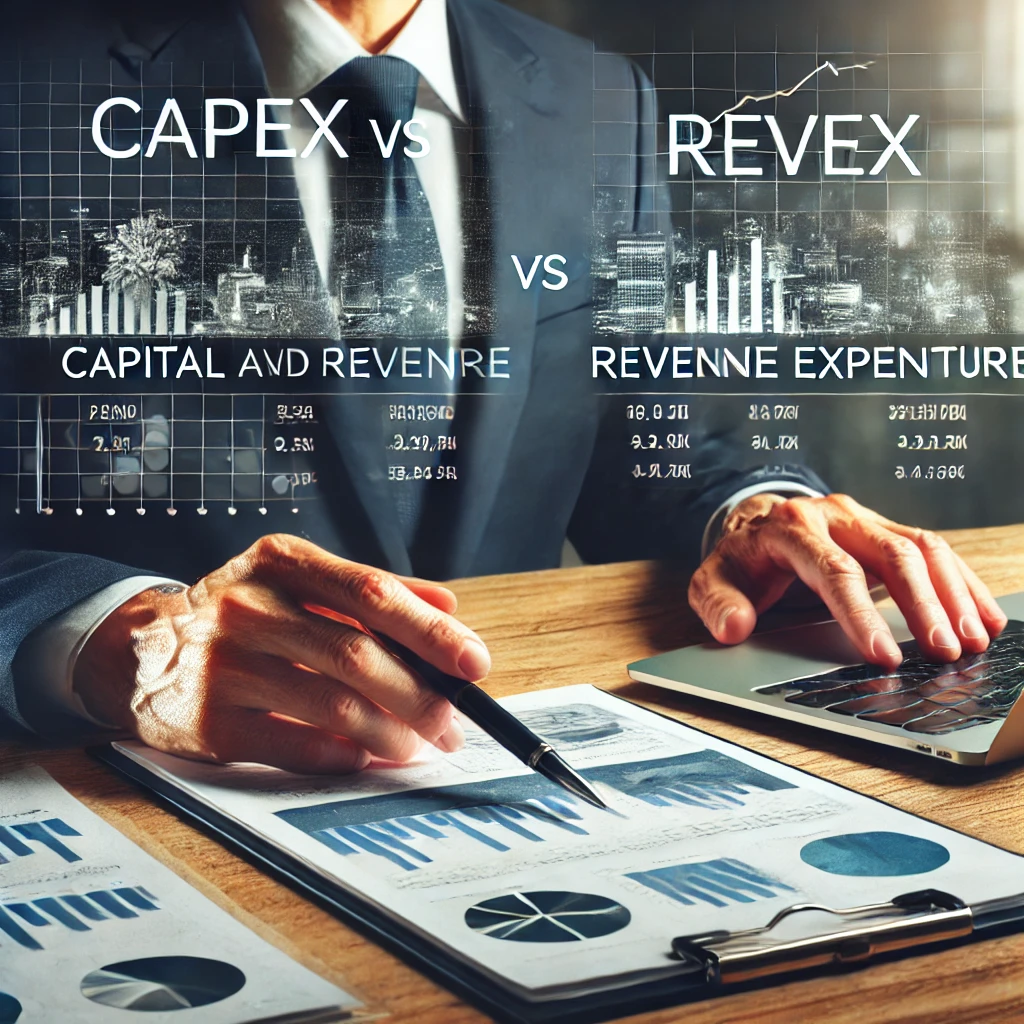Capital Expenditure vs. Revenue Expenditure: A Modern Financial Perspective
In today’s dynamic business environment, understanding the distinction between capital expenditure (CapEx) and revenue expenditure (RevEx) is crucial for financial decision-making. These classifications impact financial statements, tax planning, and regulatory compliance, influencing a company’s long-term valuation and sustainability. This blog explores these concepts, incorporating technical terminologies, legal references, and a modern business approach to financial management.
Understanding Capital Expenditure: The Concept of Enduring Benefits
Capital Expenditure (CapEx) refers to investments in long-term assets that provide enduring economic benefits beyond the current accounting period. These expenditures are recorded as assets and systematically allocated over time through depreciation, amortization, or impairment testing, depending on the nature of the asset.

Legal and Accounting Framework:
- IAS 16 – Property, Plant, and Equipment (PPE): Governs the capitalization and depreciation of tangible assets.
- IAS 38 – Intangible Assets: Defines the recognition of software, patents, trademarks, and goodwill.
- Section 32 of the Income Tax Act, 1961 (India): Allows depreciation on capitalized assets for tax purposes.
- FASB ASC 350: Provides guidelines on capitalizing and amortizing intangible assets in U.S. GAAP.
Examples of Capital Expenditure:
- Tangible Assets: Machinery, real estate, infrastructure
- Intangible Assets: Software development, brand acquisition, research and development (meeting capitalization criteria under FASB ASC 730)
- Leasehold Improvements: Significant modifications under FASB ASC 842 (Lease Accounting Standards)
Impact of Capital Expenditure:
- Strengthens the balance sheet by increasing assets
- Spreads cost recognition over multiple years, reducing short-term expense impact
- Enhances financial ratios, improving investor confidence and creditworthiness
Revenue Expenditure: Immediate Recognition for Short-Term Costs
Revenue Expenditure (RevEx) refers to immediately deducting a cost in the accounting period it is incurred. This treatment applies when a cost does not provide enduring economic benefits beyond the current financial period.
Legal and Accounting Considerations:
- GAAP and IFRS: Require expenses to be recognized in the period in which they are incurred (matching principle).
- IRS Tangible Property Regulations (U.S.): Guide businesses on whether costs should be expensed or capitalized.
- Section 37(1) of the Income Tax Act, 1961 (India): Covers general business expenses that are not capital in nature.
Examples of Revenue Expenditure:
- Salaries and employee benefits
- Office supplies and consumables
- Utility bills, rent, and lease payments
- Marketing and advertising expenses
- Routine maintenance and repairs (as per IRS Repair Regulations)
Impact of Revenue Expenditure:
- Reduces taxable income immediately, lowering current tax liability
- Increases operational expenses, which may affect short-term profitability
- Reflects accurate short-term financial health but does not impact long-term asset valuation
Capital Expenditure vs. Revenue Expenditure: A Strategic Decision for Modern Businesses
- Business Model Alignment:
- Tech companies capitalize R&D costs (IFRS/GAAP compliant) to improve financial reporting.
- Service firms expense most operating costs to maintain profitability transparency.
- Tax Optimization Strategies:
- Capitalizing costs reduces short-term tax benefits but ensures long-term deductions.
- Expensing lowers current taxable income, providing immediate relief.
- Investor and Market Perception:
- Capitalization enhances asset valuation, making businesses attractive to investors.
- Aggressive expensing strategies may signal financial caution but improve cash flow planning.
Final Thoughts: Making the Right Financial Choice
In the modern financial landscape, businesses must strategically balance capital and revenue expenditure to optimize tax benefits, financial stability, and market positioning. Ensuring compliance with GAAP, IFRS, and local taxation laws is crucial to making sound financial decisions.
For expert advice on financial management, tax compliance, and offshore accounting solutions, trust Fimaco™ – Your Global Partner in Accounting and Virtual CFO Services.
Stay ahead in financial strategy! Contact Fimaco™ today to optimize your accounting and business planning
CapitalExpenditure #RevenueExpenditure #Accounting #Finance #TaxPlanning #IFRS #GAAP #FinancialManagement #BusinessStrategy #CapEx #RevEx #CFO #FinancialReporting #Investment #Fimaco #CorporateFinance



